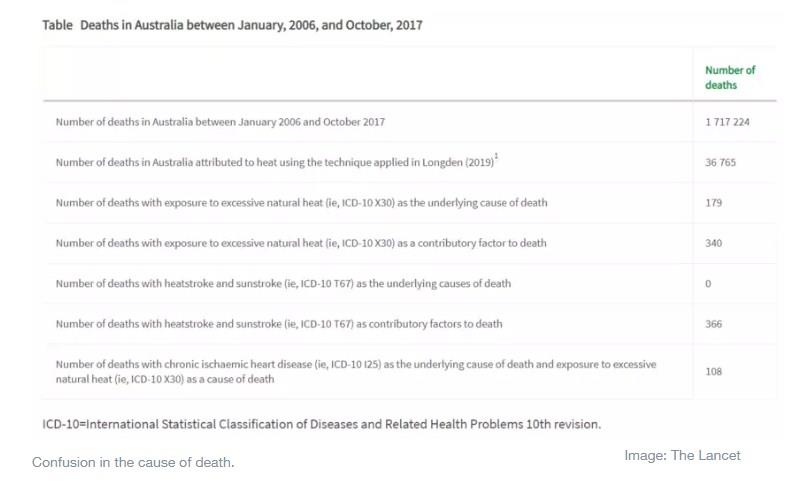by Thomas Longden
-Countries such as Australia are vastly underestimating deaths attibuted to excess heat, according to a new study.
-The estimates may in fact be up to 50 times lower than the correct number.
-Accurate results in deaths caused by excessive heat can help us to better understand the effects of climate change.
-To do this, it is vital we modernize and improve training around how death certificates are published, the study’s authors say.
National mortality records in Australia suggest substantial under-reporting of heat-related mortality. Less than 0·1% of 1·7 million deaths between 2006 and 2017 were attributed directly or indirectly to excessive natural heat (table). However, recent research1 indicates that official records underestimate the association at least 50-fold.

Understanding the degree to which environmental factors affect human health is important if the impact of climate change is to be fully appreciated. As severe environmental events become more common, correct reporting and attribution is needed for effective evidence-based responses and to guide local, national, and global adaptation.
The issue of under-reporting death from heat parallels cases of lightning strikes, in which the direct cause (eg, a falling tree branch or the collapse of a building on fire) is reported without any reference to the indirect cause (ie, the initial lightning strike that triggered events culminating in death).
Non-biomedical external factors are often omitted on death certificates, contributing to inaccuracies in cause-of-death estimations in many countries. Other factors contributing to poor quality data include scarcity of resources necessary to maintain or improve the data quality and a lack of physician training in death certificate completion.3In response to such weaknesses, many countries are exploring ways to modernise death certification and recording processes.
Given the unpredictable nature and global scale of climatic and other environmental events, such as the Australian heatwaves and bushfires of 2019–20, it is imperative that systems designed to monitor national mortality accurately reflect the impact of large-scale environmental events.
Combining death and temperature data sources to estimate temperature-related mortality or augment death certification data will improve the surveillance of heat-related mortality. However, for more than 2 billion people who live in tropical locations that are most vulnerable to heat, the resources required for valid mortality data are scarce.
Climate change is a concern to many people. But if the effect of extreme temperatures is not recorded, its full impact can never be understood. Death certification needs to be modernised, indirect causes should be reported, with all death certification prompting for external factors contributing to death, and these death data must be coupled with large-scale environmental datasets so that impact assessments can be done.We declare no competing interests.
*first published in: www.weforum.org




 By: N. Peter Kramer
By: N. Peter Kramer
